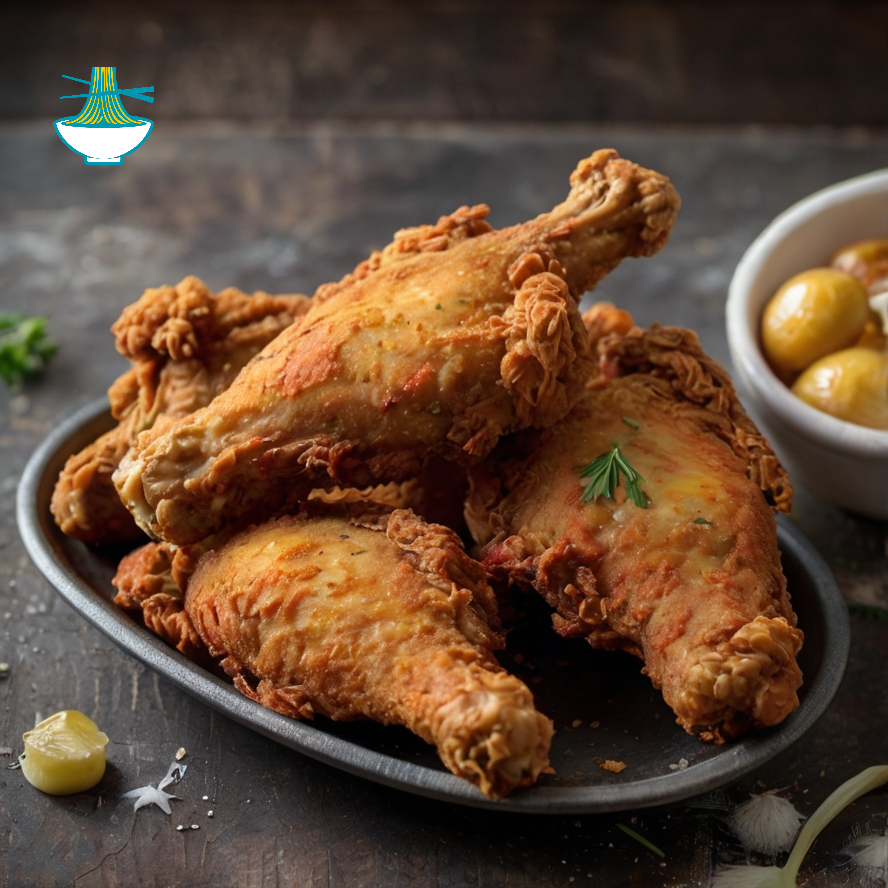Southern fried chicken is a beloved dish characterized by chicken pieces coated in flour or batter and deep-fried until golden and crispy. This culinary tradition has deep roots in Southern American cuisine, with variations found in African American, Scottish, and Native American cooking influences. The practice of frying chicken in the Southern style dates back to the early 19th century, evolving over time to become a staple comfort food associated with hospitality and family gatherings.
Here's a clear and uncomplicated recipe for Southern fried chicken:
Ingredients:
- 1 whole chicken, cut into pieces
- 1 cup all-purpose flour
- 1 teaspoon salt
- 1 teaspoon black pepper
- 1 teaspoon paprika
- 1/2 teaspoon garlic powder
- 1/2 teaspoon onion powder
- Vegetable oil for frying
Method:
1. In a bowl, mix the flour, salt, pepper, paprika, garlic powder, and onion powder.
2. Coat each chicken piece with the flour mixture, shaking off any excess.
3. Heat vegetable oil in a deep skillet or frying pan over medium-high heat.
4. Fry the chicken pieces in batches until golden brown and cooked through, about 12-15 minutes per batch.
5. Drain the fried chicken on paper towels to remove excess oil.
6. Serve hot and enjoy your crispy Southern fried chicken!
Nutrition Value:
1. 1 whole chicken, cut into pieces:
- Calories: Approximately 165 calories per 100 grams (cooked without skin).
- Carbohydrates: Negligible (less than 1 gram per 100 grams).
- Protein: About 31 grams per 100 grams (cooked without skin).
- Fat: Around 3.6 grams per 100 grams (cooked without skin).
- Sodium: Varies based on preparation; typically, around 74 milligrams per 100 grams.
- Cholesterol: About 85 milligrams per 100 grams (cooked without skin).
- Vitamins and minerals: Rich in vitamin B6, niacin, phosphorus, and selenium.
- Nutritional benefit: Chicken provides high-quality protein, essential amino acids, and various vitamins and minerals necessary for muscle growth, immune function, and overall health.
2. 1 cup all-purpose flour:
- Calories: Approximately 455 calories per cup (125 grams).
- Carbohydrates: About 95 grams per cup.
- Protein: Around 12 grams per cup.
- Fat: About 1.2 grams per cup.
- Sodium: Typically very low unless enriched with salt.
- Cholesterol: Zero.
- Vitamins and minerals: Contains small amounts of iron, calcium, and B vitamins.
- Nutritional benefit: Flour provides energy from carbohydrates and some protein, but it's not particularly nutrient-dense compared to whole grains.
3. 1 teaspoon salt:
- Calories: Negligible.
- Carbohydrates: Negligible.
- Protein: Negligible.
- Fat: Negligible.
- Sodium: Around 2,300 milligrams per teaspoon (the recommended daily intake for adults is 2,300 milligrams or less).
- Cholesterol: Zero.
- Vitamins and minerals: None significant.
- Nutritional benefit: Salt is necessary for flavoring but should be used in moderation due to its impact on blood pressure and cardiovascular health.
4. 1 teaspoon black pepper:
- Calories: Negligible.
- Carbohydrates: Negligible.
- Protein: Negligible.
- Fat: Negligible.
- Sodium: Negligible.
- Cholesterol: Zero.
- Vitamins and minerals: Contains small amounts of manganese, vitamin K, and iron.
- Nutritional benefit: Black pepper adds flavor and may have antioxidant properties.
5. 1 teaspoon paprika:
- Calories: Negligible.
- Carbohydrates: Negligible.
- Protein: Negligible.
- Fat: Negligible.
- Sodium: Negligible.
- Cholesterol: Zero.
- Vitamins and minerals: Contains vitamin A, vitamin E, and small amounts of iron.
- Nutritional benefit: Paprika contributes color, flavor, and a modest amount of vitamins.
6. 1/2 teaspoon garlic powder:
- Calories: Around 5 calories per 1/2 teaspoon.
- Carbohydrates: About 1 gram per 1/2 teaspoon.
- Protein: Negligible.
- Fat: Negligible.
- Sodium: Varies by brand; typically, around 1 milligram per 1/2 teaspoon.
- Cholesterol: Zero.
- Vitamins and minerals: Contains small amounts of vitamin C, vitamin B6, and manganese.
- Nutritional benefit: Garlic powder adds flavor and may have some health benefits like supporting immune function.
7. 1/2 teaspoon onion powder:
- Calories: Around 5 calories per 1/2 teaspoon.
- Carbohydrates: About 1 gram per 1/2 teaspoon.
- Protein: Negligible.
- Fat: Negligible.
- Sodium: Varies by brand; typically, around 1 milligram per 1/2 teaspoon.
- Cholesterol: Zero.
- Vitamins and minerals: Contains small amounts of vitamin C, vitamin B6, and manganese.
- Nutritional benefit: Onion powder adds flavor and may contribute to antioxidant intake.
8. Vegetable oil for frying:
- Calories: Approximately 120 calories per tablespoon (14 grams).
- Carbohydrates: Zero.
- Protein: Zero.
- Fat: About 14 grams per tablespoon, primarily unsaturated fats.
- Sodium: Zero.
- Cholesterol: Zero.
- Vitamins and minerals: Varies depending on the oil; may contain vitamin E.
- Nutritional benefit: Provides energy from fats but should be used in moderation due to its calorie density. Choose healthier oils like olive oil for frying.


Comments